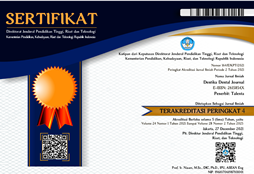METASTATIC PROCESS OF ORAL SQUAMOUS CELL CARCINOMA
PROSES METASTASE SEL KARSINOMA ORAL SKUAMOUS DI RONGGA MULUT
DOI:
https://doi.org/10.32734/dentika.v17i3.1775Keywords:
squamous cell carcinoma, metastasis, extracellular matrix, proteolytic enzymeAbstract
Squamous cell carcinoma (SCC) is the most common malignant tumour in oral cavity. This cancer arises from oral mucosal epithel and also it often causes high rate of morbidity and mortality. Metastasis is one of the major causes of mortality in patient with cancer. This is because metastasis has often occurred before the primary tumor it self is detected. Lymphogenous metastasis is specific for carcinoma. In the late stage, cancer cells from the lymphatic system may enter blood circulation. In brief, steps of the metastatic process may be outlined as follows: genetic alteration, modulation of extracellular matrix and proteolysis, damage cell adhesion, damage tumour cell migration, and also angiogenesis. The involved process factors are genetic factors such as nm23, p16, Lin-7C; proteolitic enzyme such as MMP-1, MMP-2, MMP-3, MMP-8 MMP-9, MMP-14, MMP-15, MMP-17, cathepsin B, D, and O; adhesion between adhesive proteins for example integrin, laminin, cadherin, maspin. In conclusion, the whole process from genetic alterations until the occurence of independent cell is a complex process that involves interactions among the related factors.
















